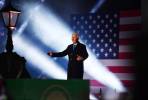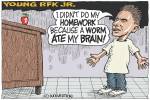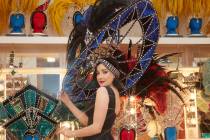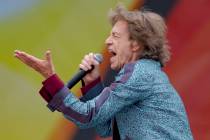Comic fest guest star is a cult figure and ‘acquired taste’

The top-billed guest at this year’s Vegas Valley Comic Book Festival hasn’t been to Las Vegas in 25 years (even though he lives in Los Angeles), doesn’t like the “Mardi Gras” big comic conventions have turned into, and is embarrassed by the most pop-culture thing he’s ever done.
“I’m an acquired taste,” says Howard Chaykin.
“I recognize the fact that I’m a cult figure. I’ve never been a star and I never will be.”
But as cult figures go, he’s remarkably dependable.
I was excited to talk to Chaykin because he has written and drawn comics with a consistent wit and style since I first paid a quarter for a book called “The Scorpion” in the mid-’70s. Whatever else has happened in the past 40 years, Chaykin’s world of sharp-dressed film noir has always been there waiting in another permutation.
Authors such as Stephen King also execute with astonishing output and quality control. But Chaykin, 64, is more akin to the prolific film output of Woody Allen in the way he always seems to have something new, yet operates in a vacuum: “I’m sort of operating on my own little planet. I’m not paying attention to anything. Because I’m old and I can get away with that.”
Living long enough to see comics go mainstream and Hollywood doesn’t impress him much either.
“It’s really just a matter of the guys who beat us up in high school finally figuring out a way to make money off our asses,” he says.
Chaykin occasionally gets to dabble with franchise characters such as Batman and The Shadow. He worked on the old 1990 TV version of “The Flash.”
But most of his creations are original concepts that fit within his world. It can be past, present or future but always seems drawn from the same well of stilettos, fedoras and neurotically dark humor.
“I grew up watching the Warner Bros. crime pictures,” the native New Yorker says. “The Warners crime films were why I taught myself not to sound like Leo Gorcey or Huntz Hall. I realized very early on that everybody in the movies who sounded like me was supposed to be stupid.”
His heroes all look the same. At some point over the years, I decided it was an in-joke: Chaykin had created an imaginary actor to star in the imaginary movie versions of all his comics.
He doesn’t shoot me down on that.
“He’s always played by the illegitimate DNA spawn of James Garner, Henry Fonda and William Holden,” he says. “I subscribe completely to the Neil Simon theory of ‘Think Yiddish, go British.’ ”
And the women? Sigh. Chaykin was way ahead of the retro-burlesque craze, where spiked heels and garter belts are a sign of empowerment as well as objectification.
“I was always a big fan of underwear until Madonna put it outside,” he says. “Growing up reading the Sunday New York Times in the 1960s, there were still the lingerie ads in the magazine section, so it was just a big part of my boyhood.”
Chaykin’s work includes a notorious and very, very wrong pulp noir called “Black Kiss,” “a transgressive exercise in pushing the envelope” that came wrapped in plastic and made Quentin Tarrantino seem like a man of taste and discretion.
But Chaykin’s signature creation is “American Flagg,” the early-’80s series that rolled up all his influences and became “the first thing I did that reflected a concise synergy of visual and text.”
Its hero, Reuben Flagg, polices a futuristic mall overseen by a Big Brother known as The Plex with his sidekick Raul, a talking cat. The future concocted in the Reagan years fits comfortably with today’s reality TV and cable-news text crawls.
“RoboCop” and “Demolition Man” borrowed heavily from the Flagg milieu, reflecting Chaykin’s ability to be “completely luckless” in having his characters optioned for TV or films.
“I just can’t seem to find traction. It’s become a bit of a joke,” he says. At the same time, working for small companies over the years, many of them now out of business, “made it possible for me to be picked over and sort of borrowed from.
“I don’t want to dip into bitterness, because I’m capable of bile,” he adds.
The biggest irony of Chaykin’s career is that his most-collected books are Marvel’s licensed adaptation of the original “Star Wars” movie.
Not his best work.
“Had I known it was going to be that big a deal, I would like to think I would have done a better job,” he says.
And George Lucas even picked him for the job. “He knew my stuff very well. And I was a profound disappointment.”
Both grew up on the same movies and Edgar Rice Burroughs novels, and Han Solo turned out to be quite similar to an early Chaykin character named Cody Starbuck.
Alas, Chaykin says, “I wasn’t up to the job. The material didn’t translate as well to comics as everybody thinks it would, or should. I was also lazy, sloppy and high.”
The roads of Chaykin and Lucas never crossed again.
“I drew characters who like to (have sex) and George was much more interested in chastity,” Chaykin says. “Comic book fans tend to be aspirational. They seem to like characters who have a gruff exterior and a good heart. I don’t give a (hoot) about good hearts or gruff exteriors.”
Contact reporter Mike Weatherford at mweatherford@reviewjournal.com or 702-383-0288.
PREVIEW
What: “Spotlight on Howard Chaykin,” Vegas Valley Comic Book Festival
When: 11 a.m. Saturday
Where: Clark County Library, 1401 E. Flamingo Road
Admisson: Free


















